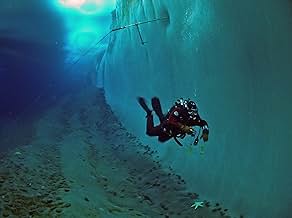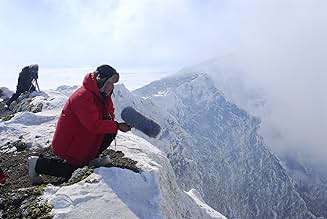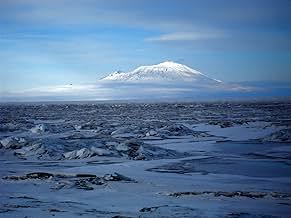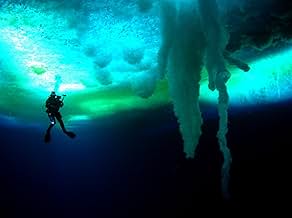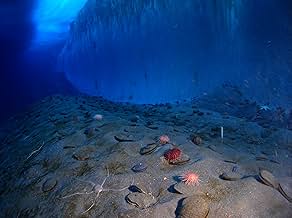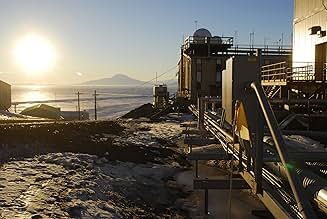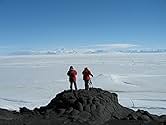CALIFICACIÓN DE IMDb
7.7/10
20 k
TU CALIFICACIÓN
Documental que retrata la vida cotidiana de los miembros de una comunidad científica en la Antártida.Documental que retrata la vida cotidiana de los miembros de una comunidad científica en la Antártida.Documental que retrata la vida cotidiana de los miembros de una comunidad científica en la Antártida.
- Dirección
- Guionista
- Elenco
- Nominado a 1 premio Óscar
- 2 premios ganados y 16 nominaciones en total
Doug MacAyeal
- Self - Glaciologist
- (as Douglas MacAyeal)
Ryan Andrew Evans
- Self - Filmmaker, Cook
- (as Ryan A. Evans)
- Dirección
- Guionista
- Todo el elenco y el equipo
- Producción, taquilla y más en IMDbPro
Opiniones destacadas
Encounters at the End of the World is a quirky and interesting film, definitely a departure from your average dry science documentary or eye-candy nature film, though it has elements of both.
It focuses predominantly on the odd collection of people drawn to live in an Antarctic research station, and to a slightly lesser degree on the oddness of the region itself, and the bizarre bits of scientific trivia that can be found there. Then there the bonus meanderings about the ultimate doom of humanity and whether we originally emerged from the sea onto land to escape the "horror" of marine ecosystems.
Many of its parts are fascinating, but for me, it didn't quite come together as a whole. It drifted in a lot of different directions, but seemed overall to be lacking in focus a bit. There were also a couple of elements that disturbed me a little - one was the inconsistency of talking about how humanity is destroying itself one moment, and then bashing "tree huggers and whale huggers" the next. I guess it's OK to notice that we're damaging the world, but not to try and do something about it? The other was that in some cases he seemed to be going out of his way to depict the people he interviewed in embarrassing ways, with things like leaving the camera lingering on them after the interview appeared to be finished, as they stood nervously, apparently trying to figure out if it was over or not.
But on the whole I would recommend it -- the flaws are offset by some impressive visuals (especially the underwater footage), dry humour, interesting ideas to ponder, and a really great soundtrack by Henry Kaiser and David Lindley, which work very well with the oddness of the content.
It focuses predominantly on the odd collection of people drawn to live in an Antarctic research station, and to a slightly lesser degree on the oddness of the region itself, and the bizarre bits of scientific trivia that can be found there. Then there the bonus meanderings about the ultimate doom of humanity and whether we originally emerged from the sea onto land to escape the "horror" of marine ecosystems.
Many of its parts are fascinating, but for me, it didn't quite come together as a whole. It drifted in a lot of different directions, but seemed overall to be lacking in focus a bit. There were also a couple of elements that disturbed me a little - one was the inconsistency of talking about how humanity is destroying itself one moment, and then bashing "tree huggers and whale huggers" the next. I guess it's OK to notice that we're damaging the world, but not to try and do something about it? The other was that in some cases he seemed to be going out of his way to depict the people he interviewed in embarrassing ways, with things like leaving the camera lingering on them after the interview appeared to be finished, as they stood nervously, apparently trying to figure out if it was over or not.
But on the whole I would recommend it -- the flaws are offset by some impressive visuals (especially the underwater footage), dry humour, interesting ideas to ponder, and a really great soundtrack by Henry Kaiser and David Lindley, which work very well with the oddness of the content.
Encounters is an almost straight forward account of Werner Herzog going to Antarctica.Invited to go by one of the scientific organizations he agreed to go because he was fascinated by life under the sea ice (see his Wild Blue Yonder which used footage from under the ice to represent an alien world) and wanted to have a chance to film life there. He also warned them it would not result in film about fluffy penguins.
This is not Shackleton's Antarctica. The main US base is more like a mining colony anywhere on the fringes of civilization then what you think of when you think Antarctica. Its strangely modern and looks to be almost anywhere people mine. Indeed there is an odd shot of the modern camp with Scott's hut in the distance that signals how times have changed.
Herzog's film is really about some of the wayward travelers who have reached the frontier. Herzog is curious what sort of people they are and finds them to be a rather philosophical lot. They are what you would consider explorers of the 18th or 19th century looking for something greater then themselves. As one guy says "Where else do you find guys with Phds doing the dishes, or linguists on the one place on earth where there is no native language." Its an amusing portrait of people I think many of us would like to be.
We also get a portrait of what life is like there. Of the eternal sun (which annoys Herzog)Of the drabness of the living quarters (motel like)mixed with individual expression. We see the survival training, the various scientific studies going on (including one about penguins which cause Herzog to ponder if they go mad). and we see the landscape both above and below the ice on land and in the sea. These portraits of the land and seascapes are stunning. Herzog's ability to mix music and image creates some hypnotic passages that in part reminded me Koyaanisqatsi or Luc Besson's Atlantis. Its magical and creates sequences that you hate to see end.
If there is any flaw is that the film kind of just ends. There is a wonderful final quote by Alan Watts, but the film ultimately feels like a philosophical travelogue about a summer vacation instead of something grander then what I saw on my vacation. I'm sure had it not been Werner Herzog behind the camera I would not have been disappointed.
Still you must see the film on a big screen if you can. Its really beautiful at times. It will enlighten and inspire you- much more than this review will. And even though this is a Discovery Channel film, I'm glad I saw it where I did because there is something about the end credits with the seal songs echoing all thorough the theater from front to back that you can't get at home. The long confines of the Film Forum in New York really allows for the magic of a sound scape.
7.5 out of 10
This is not Shackleton's Antarctica. The main US base is more like a mining colony anywhere on the fringes of civilization then what you think of when you think Antarctica. Its strangely modern and looks to be almost anywhere people mine. Indeed there is an odd shot of the modern camp with Scott's hut in the distance that signals how times have changed.
Herzog's film is really about some of the wayward travelers who have reached the frontier. Herzog is curious what sort of people they are and finds them to be a rather philosophical lot. They are what you would consider explorers of the 18th or 19th century looking for something greater then themselves. As one guy says "Where else do you find guys with Phds doing the dishes, or linguists on the one place on earth where there is no native language." Its an amusing portrait of people I think many of us would like to be.
We also get a portrait of what life is like there. Of the eternal sun (which annoys Herzog)Of the drabness of the living quarters (motel like)mixed with individual expression. We see the survival training, the various scientific studies going on (including one about penguins which cause Herzog to ponder if they go mad). and we see the landscape both above and below the ice on land and in the sea. These portraits of the land and seascapes are stunning. Herzog's ability to mix music and image creates some hypnotic passages that in part reminded me Koyaanisqatsi or Luc Besson's Atlantis. Its magical and creates sequences that you hate to see end.
If there is any flaw is that the film kind of just ends. There is a wonderful final quote by Alan Watts, but the film ultimately feels like a philosophical travelogue about a summer vacation instead of something grander then what I saw on my vacation. I'm sure had it not been Werner Herzog behind the camera I would not have been disappointed.
Still you must see the film on a big screen if you can. Its really beautiful at times. It will enlighten and inspire you- much more than this review will. And even though this is a Discovery Channel film, I'm glad I saw it where I did because there is something about the end credits with the seal songs echoing all thorough the theater from front to back that you can't get at home. The long confines of the Film Forum in New York really allows for the magic of a sound scape.
7.5 out of 10
This is an odd documentary. On one hand, I found much of the film to be rather confusing and pointless, the overall effect is still very engaging--mostly because you see things in this film you'll never see anywhere else! The famed German director Werner Herzog travels to Antarctica with a film crew. Considering Herzog's reputation, traveling there isn't much of a surprise. After all, he's the same crazed guy who took crews into the most inhospitable portions of South America to film "Fitzcarraldo" and "Aguirre: The Wrath of God". What follows is quite strange, as he goes to the most fascinating and terrific places--but also fills the movie with tons of interviews which are bizarre. Often, these folks living at the various research projects there wax very lyrical--and the film is quite philosophical but also just plain strange. It sounded, at times, like the folks living around McMurdo Station had lost their mind or were well on their way! Often, these folks talk and talk...yet appear to be saying nothing.
But, the film STILL is mesmerizing. You learn about the very unearthly sort of sounds the seals make under the ice, the sad story of a mixed-up penguin, some amazing volcano research and lots of odd facts about this MOSTLY desolate continent. Well worth seeing--just don't be too turned off by the occasionally bizarre dialog.
But, the film STILL is mesmerizing. You learn about the very unearthly sort of sounds the seals make under the ice, the sad story of a mixed-up penguin, some amazing volcano research and lots of odd facts about this MOSTLY desolate continent. Well worth seeing--just don't be too turned off by the occasionally bizarre dialog.
My school recently sponsored a screening of this film with Werner Herzog himself in attendance. Herzog joked with the audience that part of his ambition to make this film was because he wanted to document the Antarctic without making "another movie about penguins." And although a portion of the movie DOES contain a segment about penguins, it plays a minor role in a film of many elements which compose a curious and beautiful documentary. It is a study of both Nature and Man: by turns breathtaking in its landscape (especially the underwater photography), at other times funny and serious, as Herzog interviews the motley crew of individuals who call Antarctica home for the greater part of the year. Herzog narrates the film with a tongue-in-cheek sense of humor, yet always maintains respect for the subjects he covers. While he quipped with us afterward that this is not your typical Discovery Channel fare, he said he hopes to broadcast this film sometime on Discovery early next year. If that is the case, it is not a documentary anyone should miss.
The world ends at Antarctica, at least geographically - there's nothing further south - and quite possibly in a greater sense. Werner Herzog has gone there to make a film, catching the opportunity to capture some of it's beauty in a way rarely seen on film, and also to share some of his thoughts about nature and humanity. In and around the large McMurdo Research Station he circulates the various people working there, joins them on their fieldwork and interviews them, all resulting in a blend of beautiful images, personal micro-stories, funny sidetracks, well paced informative moments and an often fascinating look at nature's inexplicable mystery, humanity's as well as Mother Earth's.
This is a large canvas, perhaps slightly difficult to put in proper words. Above all, all of the ideas and thoughts within the movie stems largely from the viewer's own imagination, Herzog is merely - with his warm and serious, yet inexplicable witty, narration - planting the mental seeds and asking the questions, some rhetorical and some forever impossible to answer. And it is remarkable how he does this, how this film is designed. All throughout, Herzog moves about like a genuine tourist and at the beginning I am surprised how spontaneous the whole idea feels, almost as if I am actually watching a private home video made for personal remembrance. The only difference being of course, that it would be the kind of home video Herzog would make. And be that as it may, this is still a great movie, because it continues from this elementary first stage of how he travels to the station, combined with stock footage of the explorers of the 1800s, into that of a true thinker's exploration in a romantic setting. The form of the film gradually evolves, first small steps with the reality of the small, modern society that has been developed, the paradox of a restaurant with a beloved ice-cream machine (needless to point out further, and despised by Herzog), and with a scene of people having an unusual way of training, in case they would get lost in a blizzard. From then on, at least I was hooked and from these minor steps of humanity looking itself, if but slightly, in the mirror, the movie blossoms into a greater and greater abyss of questions that human beings will always feel the hunger to answer, questions they never will be able to answer but questions that human beings will always need to have.
Human beings, now there's another thing. Herzog encounters a lot of inhabitants of the station and gets to know them, and while not to say that there aren't interesting people throughout the movie, but here we have the adventurous woman who has her own party trick where she amuses people by becoming luggage. She has many stories to tell, like how she hitch-hiked from USA to Africa in a sewer pipe. Another man claims he once survived getting killed by the mayans . There are others with less dramatic things to say. Like one of the biologist divers, slightly sad since he's decided that at that very day he will perform his last dive. He feels like his job is done. Another man is simply showing how he has two fingers of the same length, which would prove that he's got Aztec blood in his veins. Or so they say.
You might understand what I'm getting at. In these very sequences of utter realism, we do get to feel the fresh air of a normal day out at the Antarctica. And it helps settle the notion that this is a film about humanity. We are constantly in the real world, with real people, in contrast to Grizzly Man (2005), Herzog's previous nature documentary, where we were indeed surrounded by breathtaking nature, but we were also viewing the Timothy Treadwell show, put on by the star persona of himself, if there ever were another. Here we meet the actual answer to Treadwell's love to nature. Science, philosophy, mere being in the never ending light over the ices. Herzog seems very much in love with nature, be it ice skies underneath the surface, or active, thundering volcanoes or just the remarkable penguin scene that could break your heart (even Herzog could not resist one of those sentimental scenes directed by nature, despite even claiming early on that this is "not a penguin film"). It may be penguins, but it's hauntingly beautiful nonetheless.
Throughout the movie, Herzog keeps expanding his view on nature and humanity until we reach the end, and the topic we've all been waiting for. The climate change. As you'd expect though Encounters at the End of the World is by no means a propaganda film, it would obviously be beneath Herzog's dignity. No, it seems like Herzog quietly accepts that mankind might be headed for doom - it's as natural as the deranged penguins leaving it's flock to never return - and instead asks what alien lifeforms might think of our remains if they would land to explore in thousands of years. Yes, the explorations goes on. And I think it is importance to remember that the end of the world is not the end of the world. Mother Earth will be alright. She has all the time in the universe. Makind however, we may be getting near the end. I can't help but feel, when I see the colossal, wide, arctic images and the spreading cancerstain of urbanism, that after all mankind has done, Mother Earth deserves to be left alone for a while. There has to be some peace and quiet in the Universe. If the aliens do land, and they do study our hideouts, and they do feel confused over finding a fish deep down in a tunnel in the Antarctica; I'd suggest they'd watch Encounters at the End of the World.
This is a large canvas, perhaps slightly difficult to put in proper words. Above all, all of the ideas and thoughts within the movie stems largely from the viewer's own imagination, Herzog is merely - with his warm and serious, yet inexplicable witty, narration - planting the mental seeds and asking the questions, some rhetorical and some forever impossible to answer. And it is remarkable how he does this, how this film is designed. All throughout, Herzog moves about like a genuine tourist and at the beginning I am surprised how spontaneous the whole idea feels, almost as if I am actually watching a private home video made for personal remembrance. The only difference being of course, that it would be the kind of home video Herzog would make. And be that as it may, this is still a great movie, because it continues from this elementary first stage of how he travels to the station, combined with stock footage of the explorers of the 1800s, into that of a true thinker's exploration in a romantic setting. The form of the film gradually evolves, first small steps with the reality of the small, modern society that has been developed, the paradox of a restaurant with a beloved ice-cream machine (needless to point out further, and despised by Herzog), and with a scene of people having an unusual way of training, in case they would get lost in a blizzard. From then on, at least I was hooked and from these minor steps of humanity looking itself, if but slightly, in the mirror, the movie blossoms into a greater and greater abyss of questions that human beings will always feel the hunger to answer, questions they never will be able to answer but questions that human beings will always need to have.
Human beings, now there's another thing. Herzog encounters a lot of inhabitants of the station and gets to know them, and while not to say that there aren't interesting people throughout the movie, but here we have the adventurous woman who has her own party trick where she amuses people by becoming luggage. She has many stories to tell, like how she hitch-hiked from USA to Africa in a sewer pipe. Another man claims he once survived getting killed by the mayans . There are others with less dramatic things to say. Like one of the biologist divers, slightly sad since he's decided that at that very day he will perform his last dive. He feels like his job is done. Another man is simply showing how he has two fingers of the same length, which would prove that he's got Aztec blood in his veins. Or so they say.
You might understand what I'm getting at. In these very sequences of utter realism, we do get to feel the fresh air of a normal day out at the Antarctica. And it helps settle the notion that this is a film about humanity. We are constantly in the real world, with real people, in contrast to Grizzly Man (2005), Herzog's previous nature documentary, where we were indeed surrounded by breathtaking nature, but we were also viewing the Timothy Treadwell show, put on by the star persona of himself, if there ever were another. Here we meet the actual answer to Treadwell's love to nature. Science, philosophy, mere being in the never ending light over the ices. Herzog seems very much in love with nature, be it ice skies underneath the surface, or active, thundering volcanoes or just the remarkable penguin scene that could break your heart (even Herzog could not resist one of those sentimental scenes directed by nature, despite even claiming early on that this is "not a penguin film"). It may be penguins, but it's hauntingly beautiful nonetheless.
Throughout the movie, Herzog keeps expanding his view on nature and humanity until we reach the end, and the topic we've all been waiting for. The climate change. As you'd expect though Encounters at the End of the World is by no means a propaganda film, it would obviously be beneath Herzog's dignity. No, it seems like Herzog quietly accepts that mankind might be headed for doom - it's as natural as the deranged penguins leaving it's flock to never return - and instead asks what alien lifeforms might think of our remains if they would land to explore in thousands of years. Yes, the explorations goes on. And I think it is importance to remember that the end of the world is not the end of the world. Mother Earth will be alright. She has all the time in the universe. Makind however, we may be getting near the end. I can't help but feel, when I see the colossal, wide, arctic images and the spreading cancerstain of urbanism, that after all mankind has done, Mother Earth deserves to be left alone for a while. There has to be some peace and quiet in the Universe. If the aliens do land, and they do study our hideouts, and they do feel confused over finding a fish deep down in a tunnel in the Antarctica; I'd suggest they'd watch Encounters at the End of the World.
¿Sabías que…?
- TriviaWerner Herzog dedicated the film to Roger Ebert, who he calls a true "warrior of cinema". Due to the dedication Ebert could not review the film, but he wrote a complimentary letter to Herzog and later published it.
- Citas
[last lines]
Stefan Pashov: There is a beautiful saying by an American philosopher, Alan Watts. He used to say that through our eyes the universe is perceiving itself, and through our ears the universe is listening to its cosmic harmonies. And we are the witness to which the universe becomes conscious of its glory, of its magnificence.
- ConexionesEdited from El mundo en peligro (1954)
- Bandas sonorasPlanino Stara Planino Mari
Written by Stefan Dragostinov
Performed by The Philip Koutev National Folk Ensemble
Selecciones populares
Inicia sesión para calificar y agrega a la lista de videos para obtener recomendaciones personalizadas
- How long is Encounters at the End of the World?Con tecnología de Alexa
Detalles
- Fecha de lanzamiento
- País de origen
- Sitio oficial
- Idiomas
- También se conoce como
- Encounters at the End of the World
- Locaciones de filmación
- Productoras
- Ver más créditos de la compañía en IMDbPro
Taquilla
- Total en EE. UU. y Canadá
- USD 944,933
- Fin de semana de estreno en EE. UU. y Canadá
- USD 17,730
- 15 jun 2008
- Total a nivel mundial
- USD 1,205,464
- Tiempo de ejecución
- 1h 39min(99 min)
- Color
- Mezcla de sonido
- Relación de aspecto
- 1.78 : 1
Contribuir a esta página
Sugiere una edición o agrega el contenido que falta







